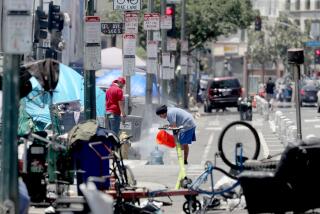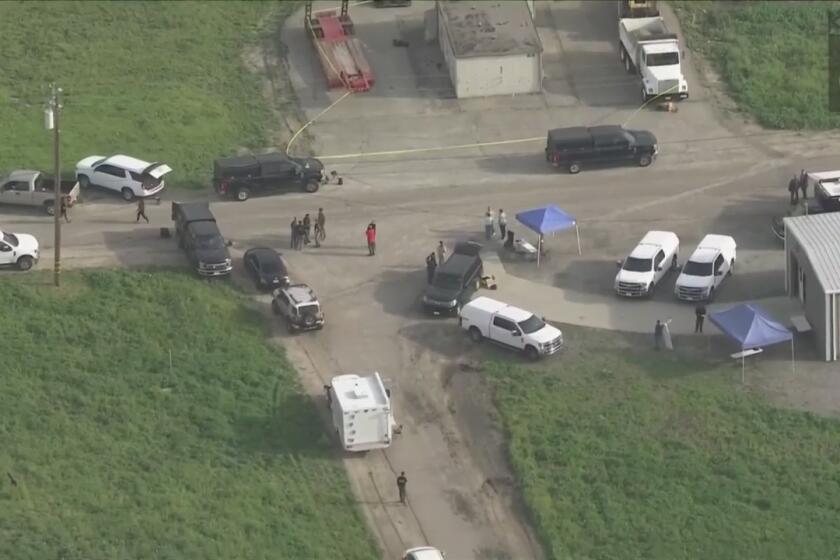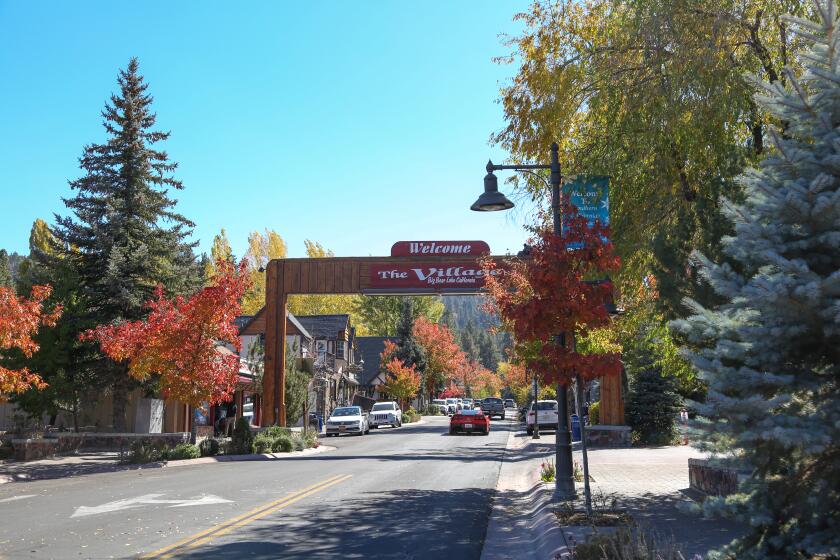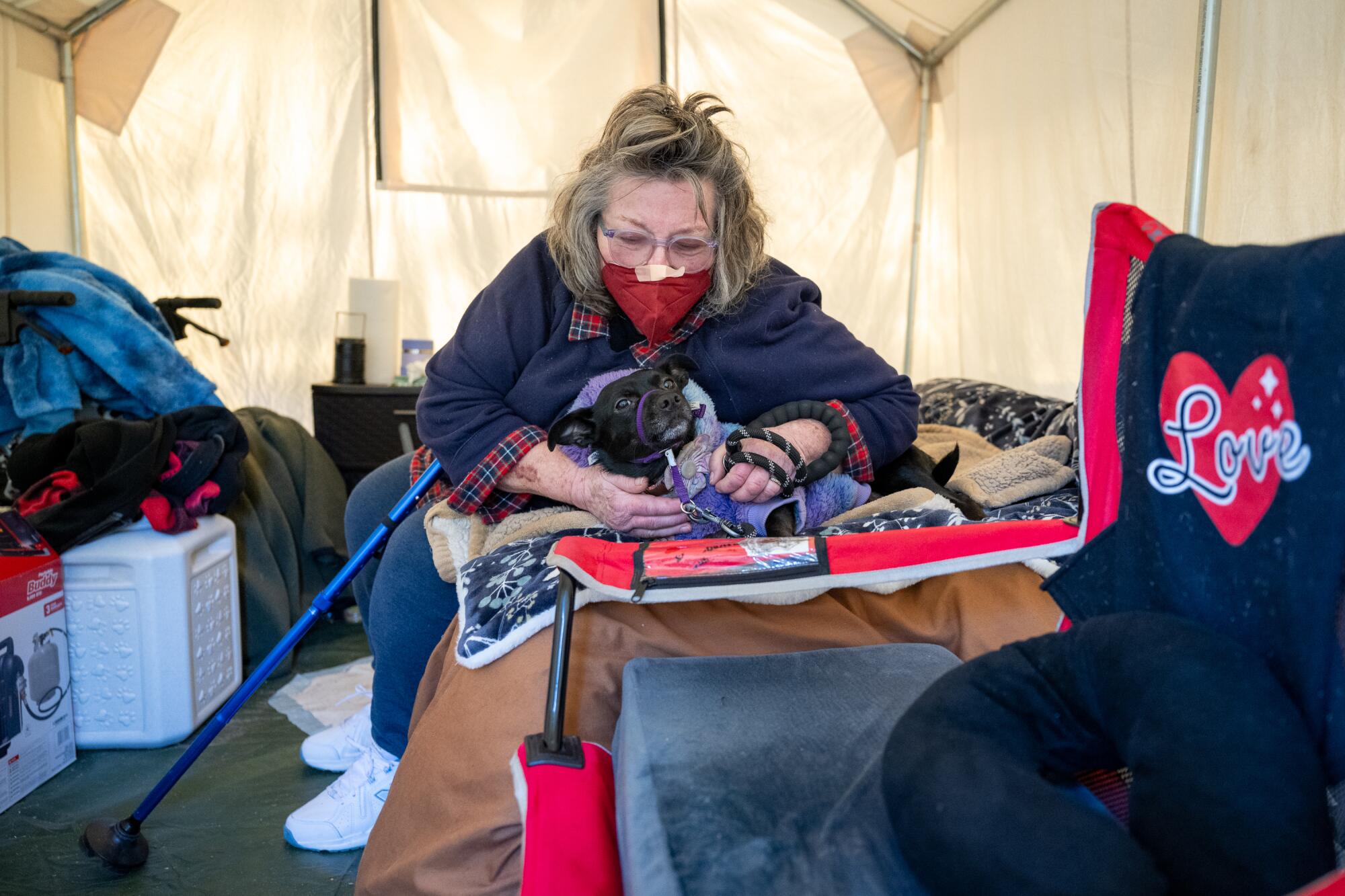
For three decades, Jamie Nelson has considered Ojai her personal paradise. It’s where she raised her children and cherishes the springtime, when the air smells like jasmine and orange blossoms.
“Lots of times, I’ve said, ‘God, I think Heaven probably smells like this,’” Nelson said of this artsy tourist town of 7,500 people.
Now, Nelson, a 74-year-old grandmother who has heart problems and bad knees and leans heavily on a cane, is homeless. She lives in a tent outside the historic Ojai City Hall, where a growing encampment filled with older people has vexed a community known for spiritual retreats, chakra-aligning crystals and organic farms.
“I was scared to death of coming here,” said Nelson, who moved to City Hall in November. “I was so afraid, because I’m older. And I got here and the people are just — they’re very precious. They are very good and very intelligent, and just had things happen.”
Thirty people live on the wooded eight-acre campus. Half are older than 55, and eight are older than 65. And — despite some locals’ assertions that they are refugees from bigger cities like Ventura and Santa Barbara — most are longtime Ojai residents, said Rick Raine, the city’s new homeless services coordinator.
“They say, ‘You’re bringing in people!’ No, people have always been here,” said Raine, who was Nelson’s neighbor years ago.
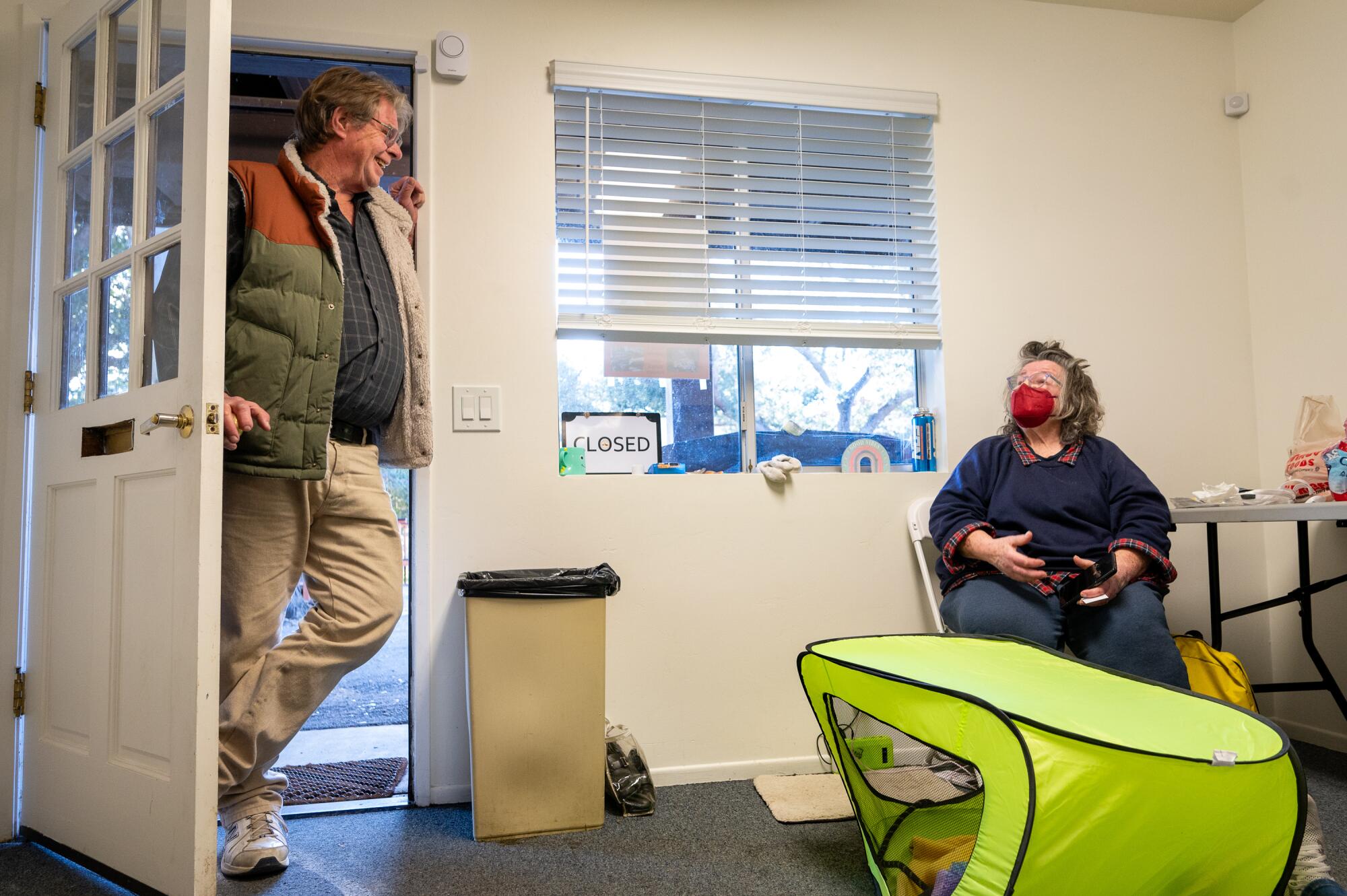
The affordable housing shortage is nothing new in Ojai, but the issue received increased attention last year after a septuagenarian member of the City Council was priced out of her rented house, declared herself homeless and was investigated by a grand jury for no longer living within her council district.
In this 4.4-square-mile city, homelessness used to be more spread out, with people sleeping in their cars or bundled in blankets in the open-air shopping arcade. Now, the crisis is harder to ignore because it is concentrated at the City Hall encampment, which has become a flashpoint as the city pours money and resources into making the setup more livable.
Local politicians and law enforcement officials say they cannot move the encampment because of decisions by the U.S. 9th Circuit Court of Appeals. Ojai has no dedicated homeless shelter, and — in cases from Boise, Idaho, and Grants Pass, Ore. — the court determined it was unconstitutional cruel and unusual punishment for cities to criminalize camping in public spaces when there are not enough shelter beds.
The U.S. Supreme Court agreed in January to review the lower court’s decision in the Oregon case and to decide whether cities can enforce camping bans. A ruling is expected this summer.
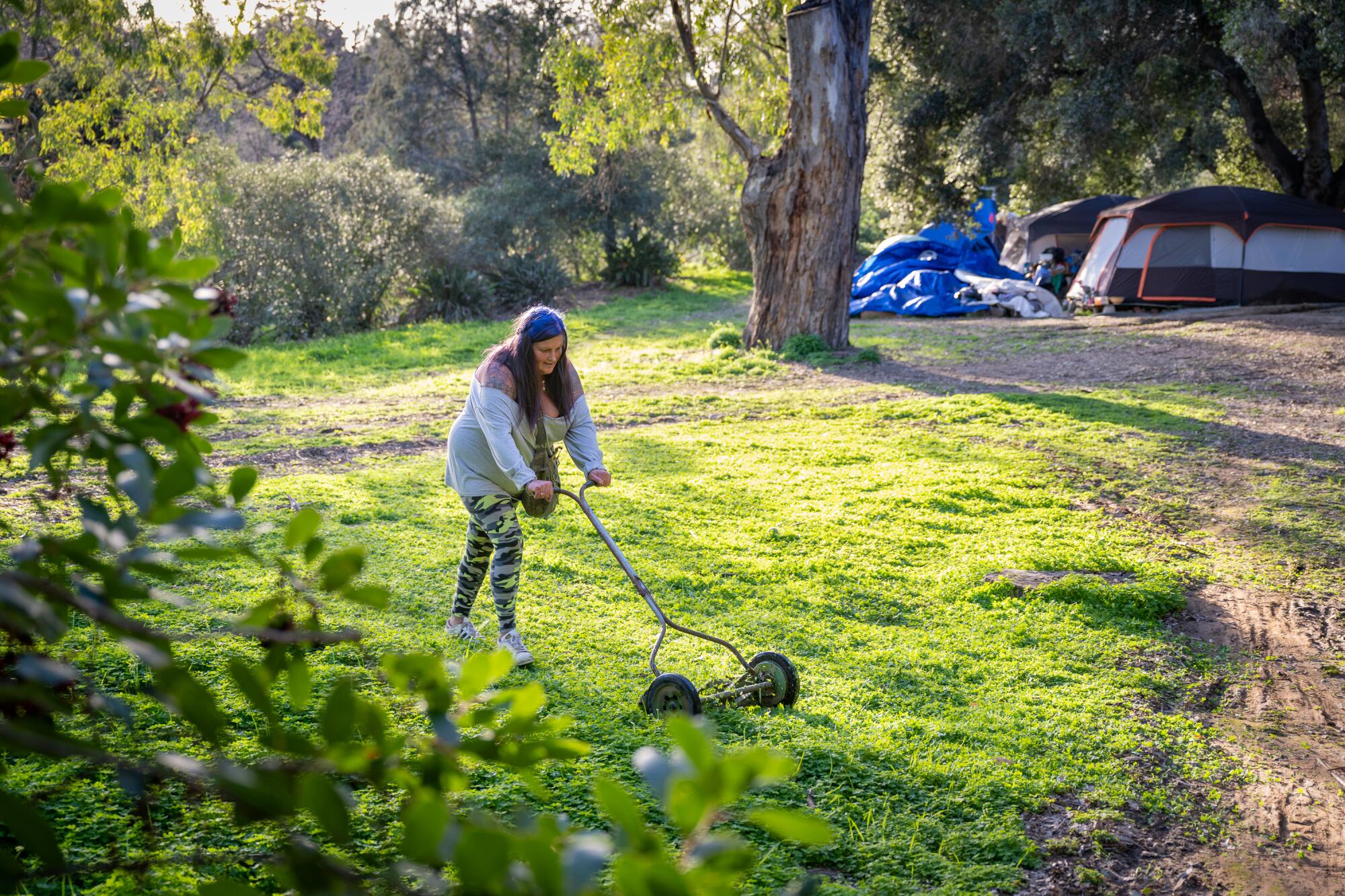
For now, the lower court rulings “really bind us with what we can do,” Ojai Police Chief Trina Newman said. Officers, she said, have responded to reports of theft, loud music, drinking and homeless people trespassing on neighbors’ property.
“We have individuals that have their share of difficulties: Addiction. Mental health problems. When you get a certain amount of people in a small area, there’s going to be problems,” she said.
“But our hands are tied.”
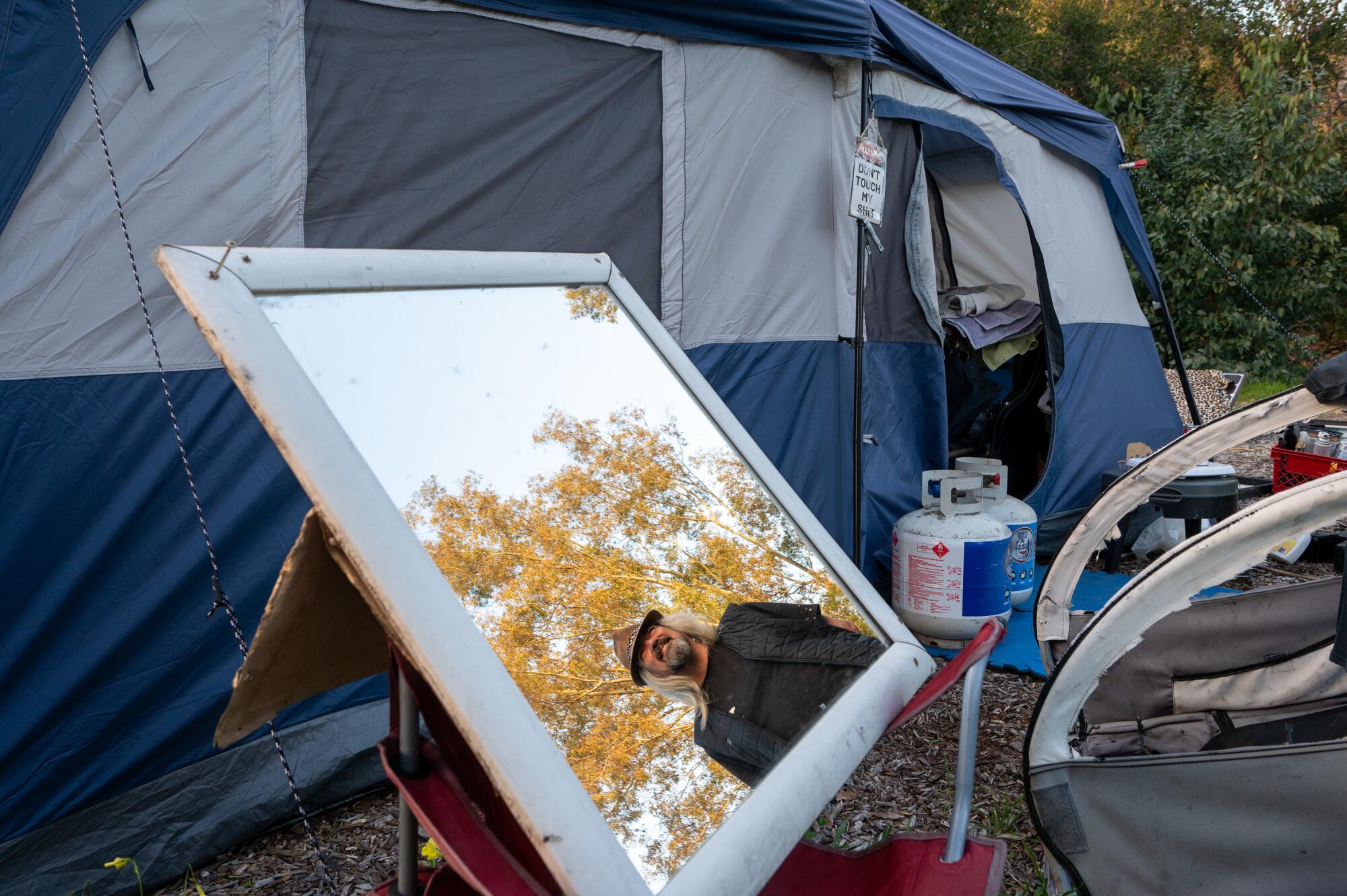
Ojai’s City Hall is an architectural gem and point of local pride. Originally a family home, later gifted to the city, it was built in 1907 as a Craftsman-style house and later remodeled to fit in with the Mission Revival architecture that Ojai became known for.
Today, scores of tents spread out just beyond the building’s stately arches and wide patios. Many of the campers try to keep the property tidy, picking up trash and cutting the grass with a manual push mower. Some keep tchotchkes — small statues, faux flowers — outside their tents to make the place feel more homey.
Over the last year, the number of people living at the encampment exploded, from about five people to 30.
At a City Council meeting in September, William Holden, a resident of Ojai for 23 years, pushed his elderly Chihuahua, Fievel Mouskawitz, in a pink stroller up to the microphone.
“I did this,” Holden, 61, said of the encampment, where he now lives.
“I invited these people who were sleeping in their cars, these people that were under the bridge, to come back here, because I’ve heard the police are not making us move like they do when you’re in an unregistered motor vehicle or sleeping where you’re not supposed to be sleeping.”
“It’s not a new problem,” he added. “It’s just been moved to where you can see it.”
City officials confirmed that word of mouth helped grow the camp, which sits on environmentally sensitive oak woodland grounds that slope down to a creek. The ground is soft, muddy and, in some portions, at risk of a landslide if it gets too saturated, Raine said.
Last fall, the City Council allocated $200,000 to deal with the crisis, and Raine was hired to be the city’s first homeless services coordinator. He opened a break room at the encampment where he brews a fresh pot of Folgers coffee every morning. He keeps blankets, coats, boots and extra food on hand — for the people and their pets.
The city added portable toilets, and, in late January, Raine and a slew of volunteers built eight sturdy wilderness tents in the parking lot, off the muddy ground. Raine said he chose eight of the older, more vulnerable campers — including Nelson — for the 8-by-10-foot tents, each of which sits on a fire-treated platform and includes a storage shed.
Four more tents will go up in the coming weeks.
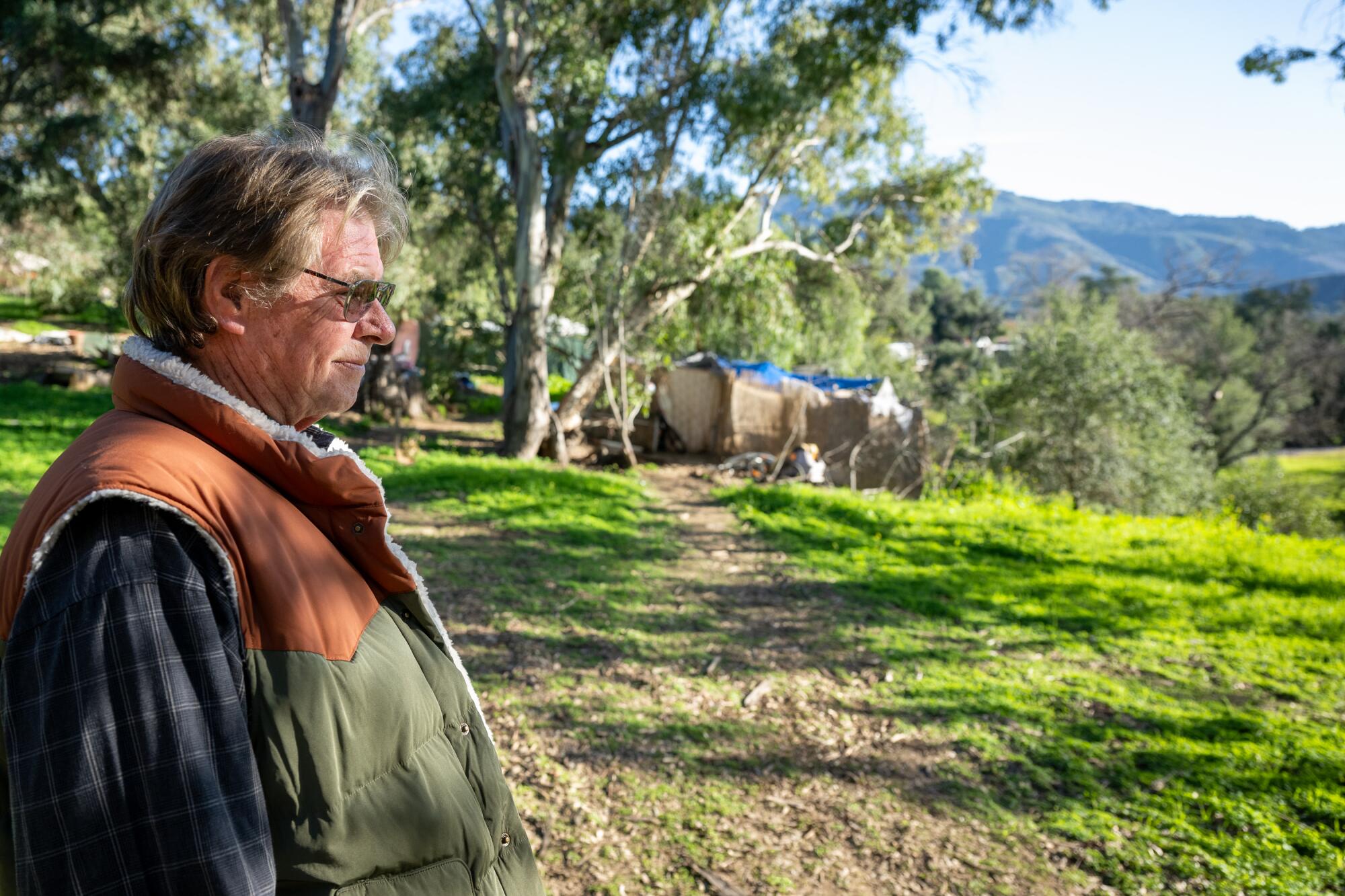
Overall, the town has been supportive of the city’s efforts, said Mayor Betsy Stix. “We’re a loving, caring community, and I think that — it’s so personal,” she said, adding that some municipal employees have a high school classmate living at the camp.
In January, the city applied for $12.4 million in state grant funding to build tiny homes and provide case management and security. City leaders have promised to relocate the encampment once the money and expansion plans are in place.
But furious neighbors don’t believe them.
“We understand that city staff has stated that the neighbors are fully on board with this plan. That could not be further from the truth,” read a January letter sent to the City Council and city manager that was signed by 47 people who live near City Hall.
One neighbor, a 73-year-old woman who has owned her house for 39 years, told The Times that the city made no effort to talk to nearby residents.
The woman, who did not give her name because she feared being harassed by people in the encampment, said she worried about fires, with people cooking under the trees and some using propane heaters in their tents. She said she also worried about vulnerable senior citizens living among other campers “who are real bullies.”
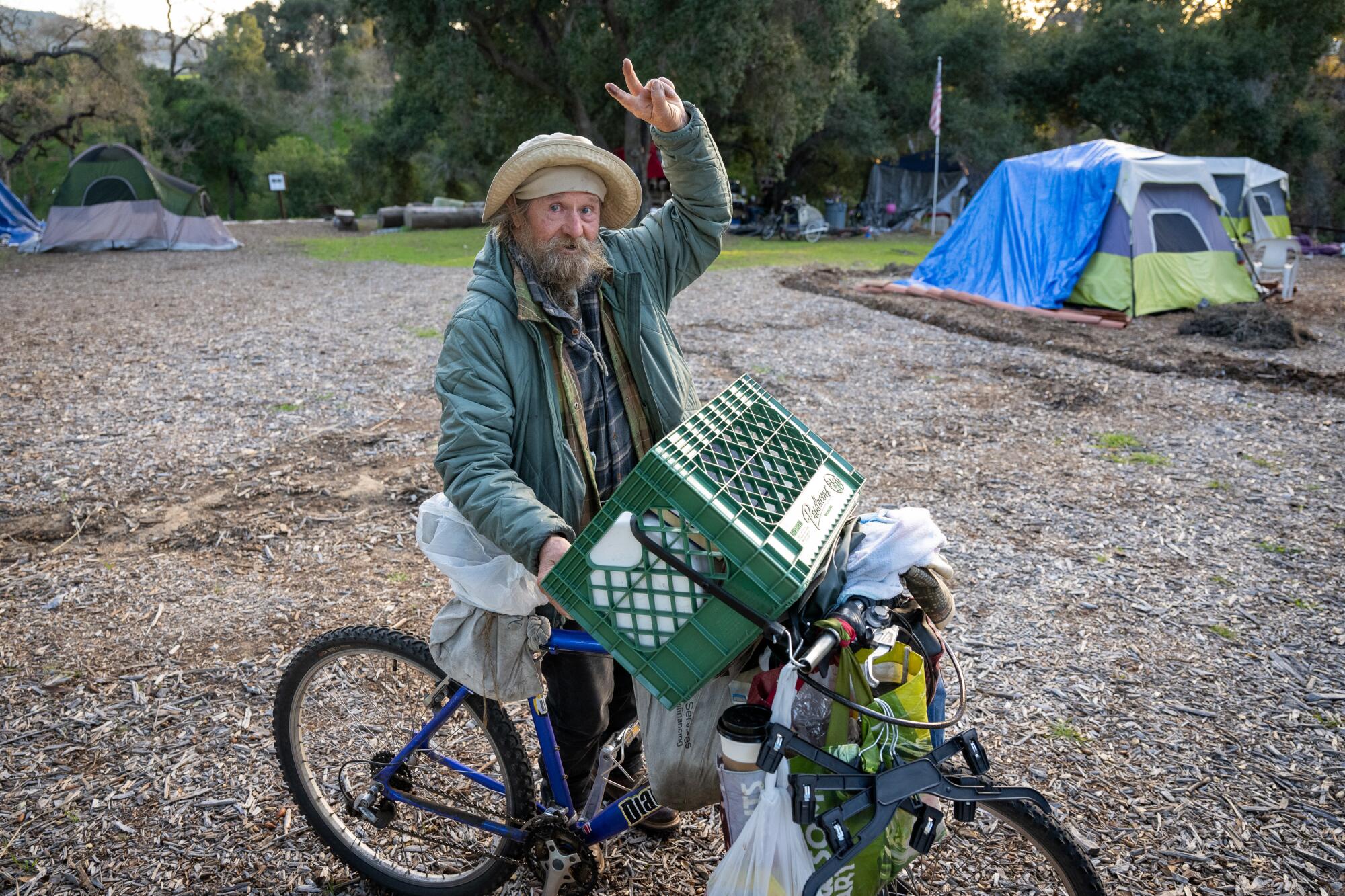
Another neighbor — a 43-year-old single mother of three who also declined to give her name — said a man from the camp lunged at her 12-year-old daughter as she rode a skateboard and that her children “do not feel safe.”
“We feel like our neighborhood has been taken over,” she said. “It’s completely changed the vibe here. There’s a port-a-potty right on the corner that doesn’t give the homeless people any privacy. It doesn’t feel like a compassionate solution for them or for us.”
During Ventura County’s point-in-time census in January 2023, Ojai recorded 44 unhoused people. That’s a 42% increase from five years prior — but a steep decline from the 82 people counted in 2007, when the annual survey began. In all of Ventura County last year, there were 2,441 homeless people, the highest number since the count began.
The sharp rise, as in so many places in California, has coincided with skyrocketing housing costs.
Santa Cruz leaders say downtown high-rises would ease housing costs. Activists call the plan ‘out of character’ for the laid-back beach town and are fighting new construction.
The average home price in Ventura County was $834,180 in December 2023, up 38% from December 2018, according to Zillow. The median rent was $2,373 in December 2023, up nearly 23% from 2018, according to data from the real estate firm Apartment List.
In Ojai, the housing shortage has been compounded by strict slow-growth laws, which — along with a ban on chain stores — were intended to maintain the small-town charm. Before an apartment complex opened in 2019, the city had gone for more than a decade without building any multifamily housing.
In December, the City Council approved a 50-unit development that will be Ojai’s first entirely affordable housing project in 30 years. In February, the council tightened a ban on short-term vacation rentals, arguing they are driving up housing costs.
“We natives have worked and volunteered hundreds of hours to keep our town small,” said Councilwoman Suza Francina, a yoga teacher who has lived in Ojai for 67 years. “The irony is that now we’re so desirable and internationally known that people want to invest. The new wave of people, they come here and can afford second and even third homes.”
Longtime residents, she said, are being priced out — including herself.
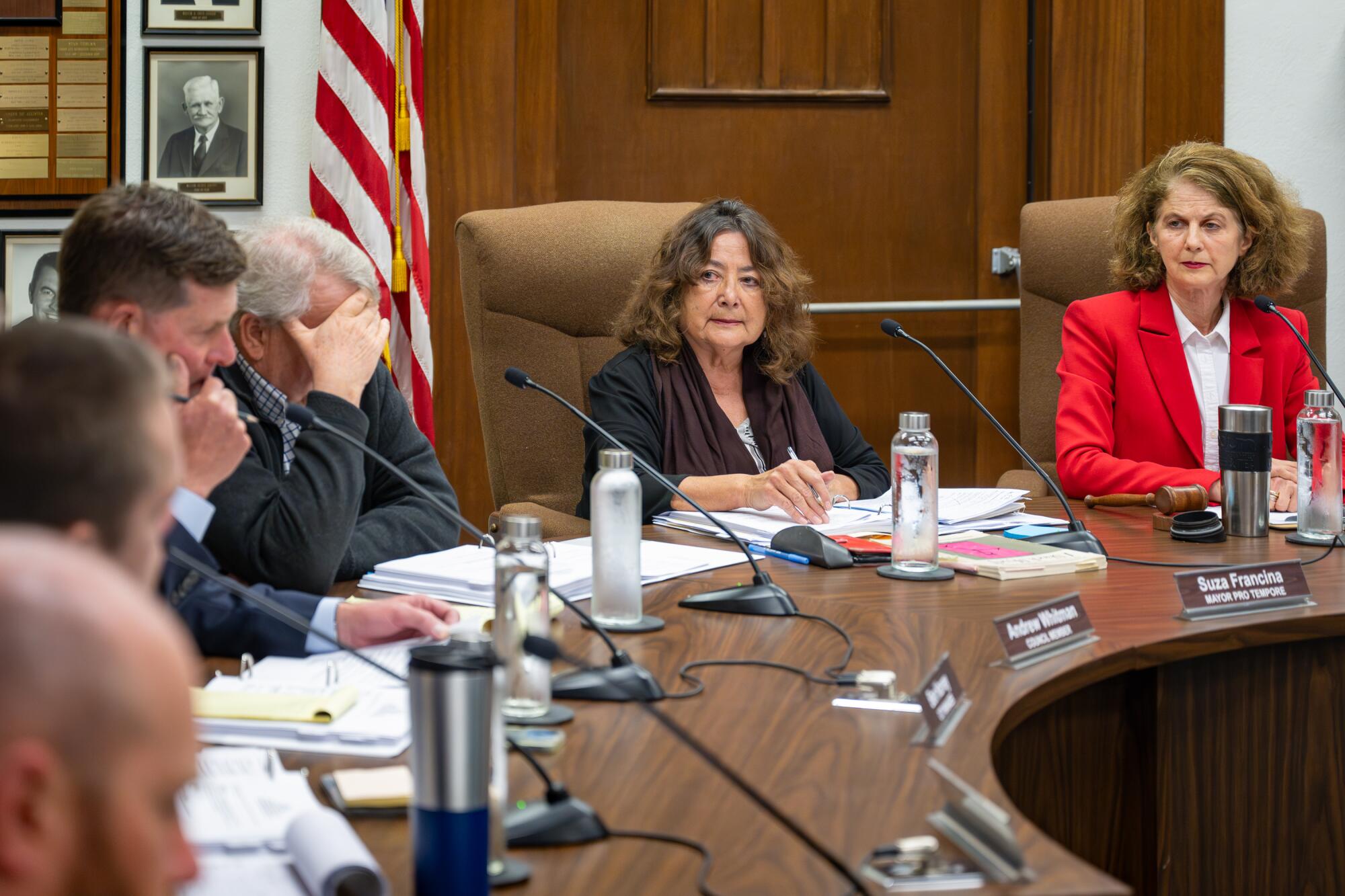
In late 2021, Francina, 74, lost the two-bedroom house she had leased for eight years when an investor purchased it, she said. Francina had been paying $1,650 a month in rent. She later saw it listed for $4,000 a month.
Francina, a former mayor, had spent more than a decade on the City Council. To keep her seat, she had to stay within her district, a roughly two-square-mile portion of south Ojai.
Francina could not find an affordable rental that would accept her two small dogs, Benny and Honey. While she searched, she moved, rent-free, into a small room with no kitchen above a friend’s garage that was in Ojai but not in her district. Francina put most of her belongings in storage and said she was homeless, arguing that people who are couch-surfing fit the description.
She was investigated by the Ventura County Grand Jury, which, in a report last May, said her seat was legally vacant since she did not find housing in her district within 30 days. But she was not removed from office.
Late last summer, Francina rented a bedroom in a house in her district for $950 a month plus utilities, along with a $300-per-month storage unit. The situation, she said, “broadened my whole perspective on how hard it is if you don’t have a home base, and how quickly it affects your mental health, how you can go downhill very quickly.”
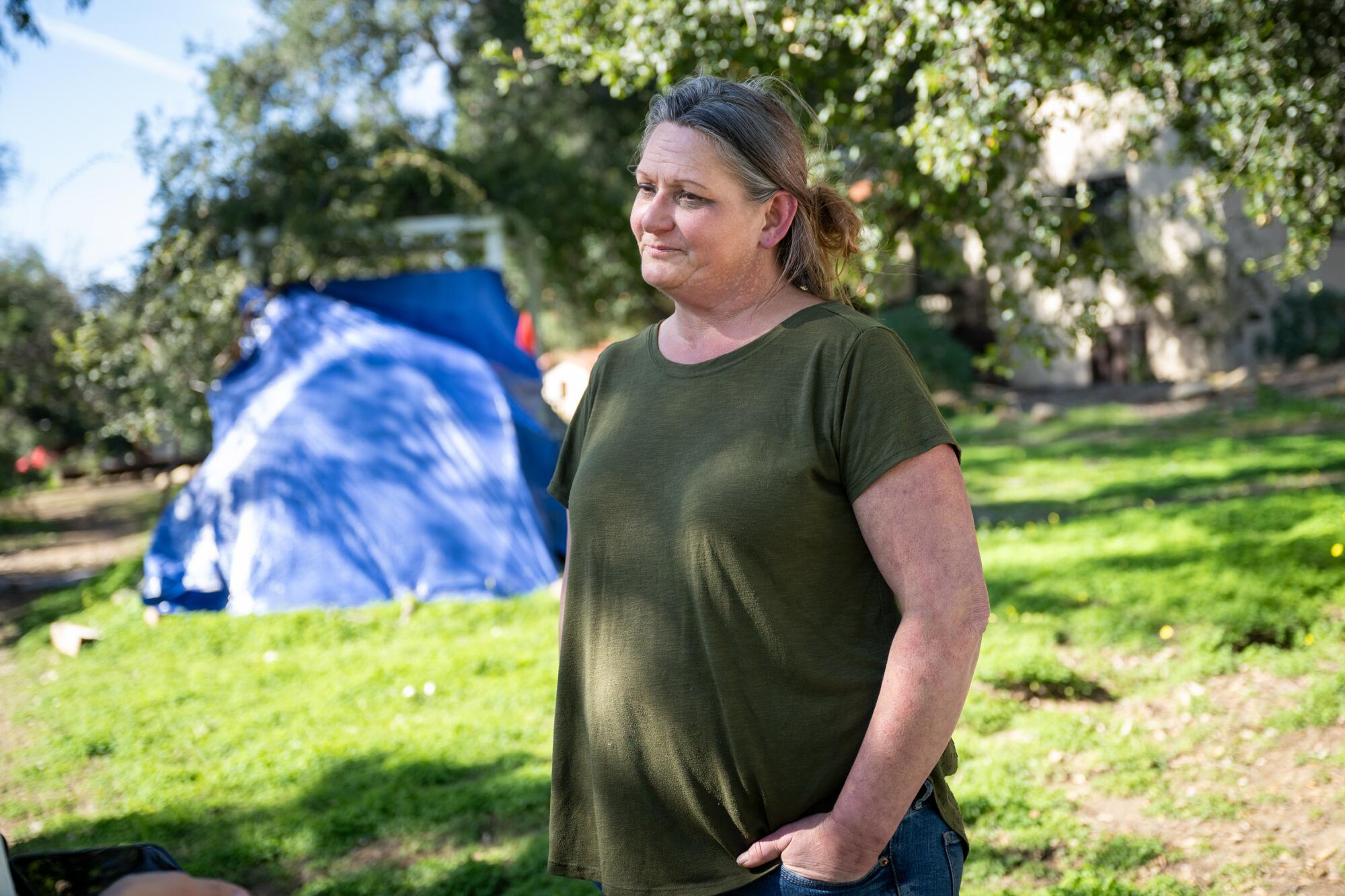
Kristen Wingate, who was born in Ojai and has spent most of her life here, also lost her rental house. But unlike Francina, she wound up in the City Hall encampment.
Wingate, 52, has degenerative disc disease. Two years ago, after a neck fusion surgery, she went on state disability. But the money ran out after a year, she said, and she was not medically cleared to go back to her job at a local hardware store. She said her application to receive Social Security disability benefits was denied, a decision she is appealing.
While she was recovering, she said, the owner of her rental house, which was split into three units, sold it. Tenants had to leave.
Wingate lived in her Toyota Camry for a while and, in August, moved into a tent at City Hall with Roscoe, her 50-pound pug and Boston terrier mix. The size of the camp broke her heart, she said, and “everything is just too expensive here” in this town she grew up in. A friend she has known since she was 6 also lives at the encampment.
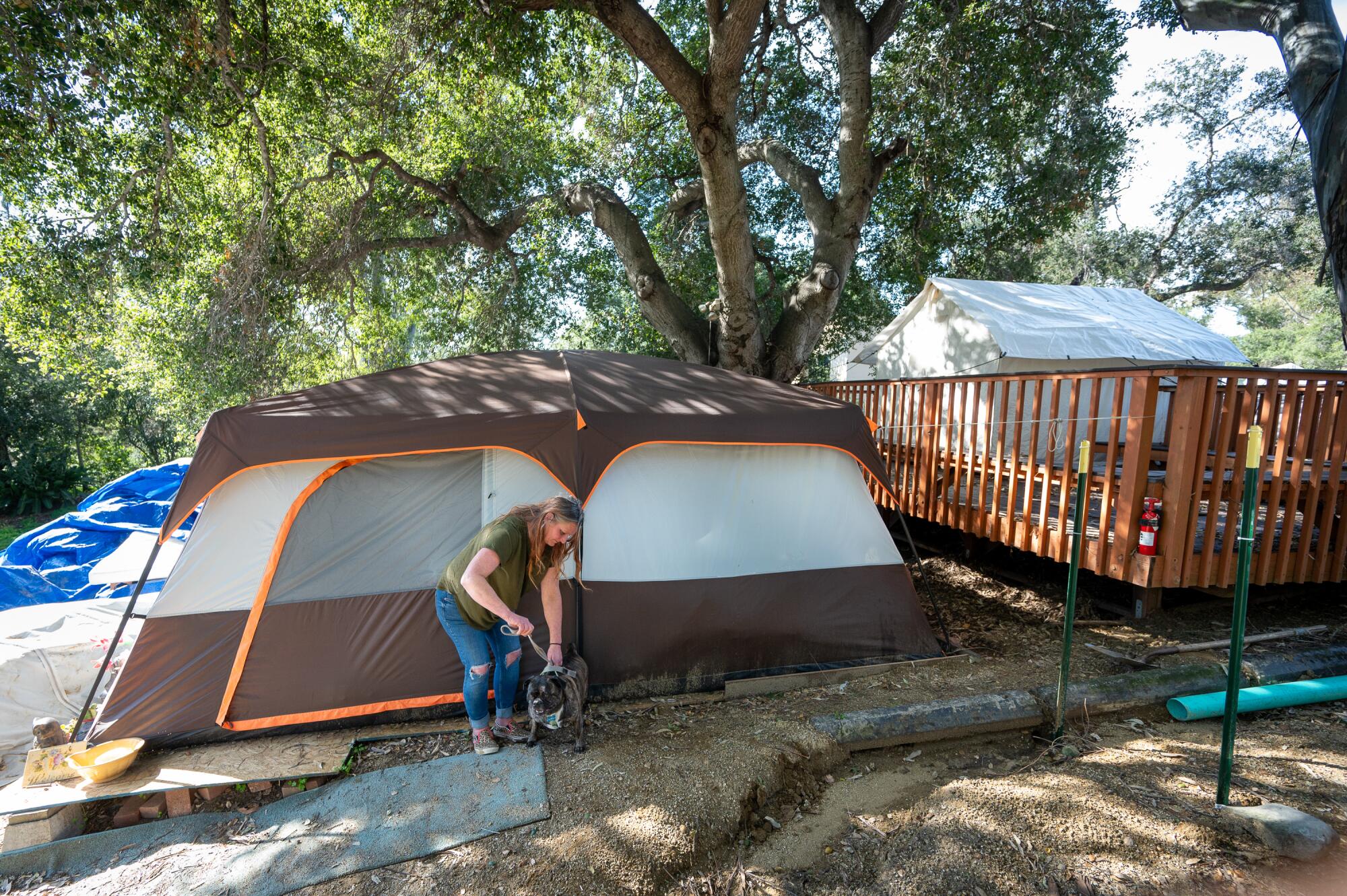
Wingate’s brown tent sits near a wooden gazebo with chipped white paint. Her sister got married there decades ago. Now, there are tents on either side.
Nelson lives nearby in one of the new white tents, beneath an enormous eucalyptus tree, with her 3-year-old Chihuahua mix, Mae Mae.
Bespectacled, with shoulder-length gray hair and a quick laugh, Nelson said she lost her husband to pancreatic cancer six years ago. She ran out of money, moved out of her house, then out of a hotel. She moved to City Hall just before Thanksgiving.
She is stoic, a trait from her south Texas upbringing. Asked if the last few years had been tough, she downplayed her situation: “A little tough, yeah. But the people here always made it better. And being in Ojai just made it all better.”
She hopes the city is able to build tiny homes for people in the encampment. For now, she waits.
On a recent Tuesday night, at a City Council meeting inside City Hall, a discussion about giving grant money to local artists dragged on for more than an hour. Then protesters — including one soaked in faux blood who collapsed and performed the motions of dying — called for a cease-fire in Gaza, half a world away.
Just outside, temperatures dipped into the 40s. In her tent, Nelson piled on blankets, held her dog close and went to sleep.
Times staff writer Andrew Khouri contributed to this report.
More to Read
Start your day right
Sign up for Essential California for news, features and recommendations from the L.A. Times and beyond in your inbox six days a week.
You may occasionally receive promotional content from the Los Angeles Times.



